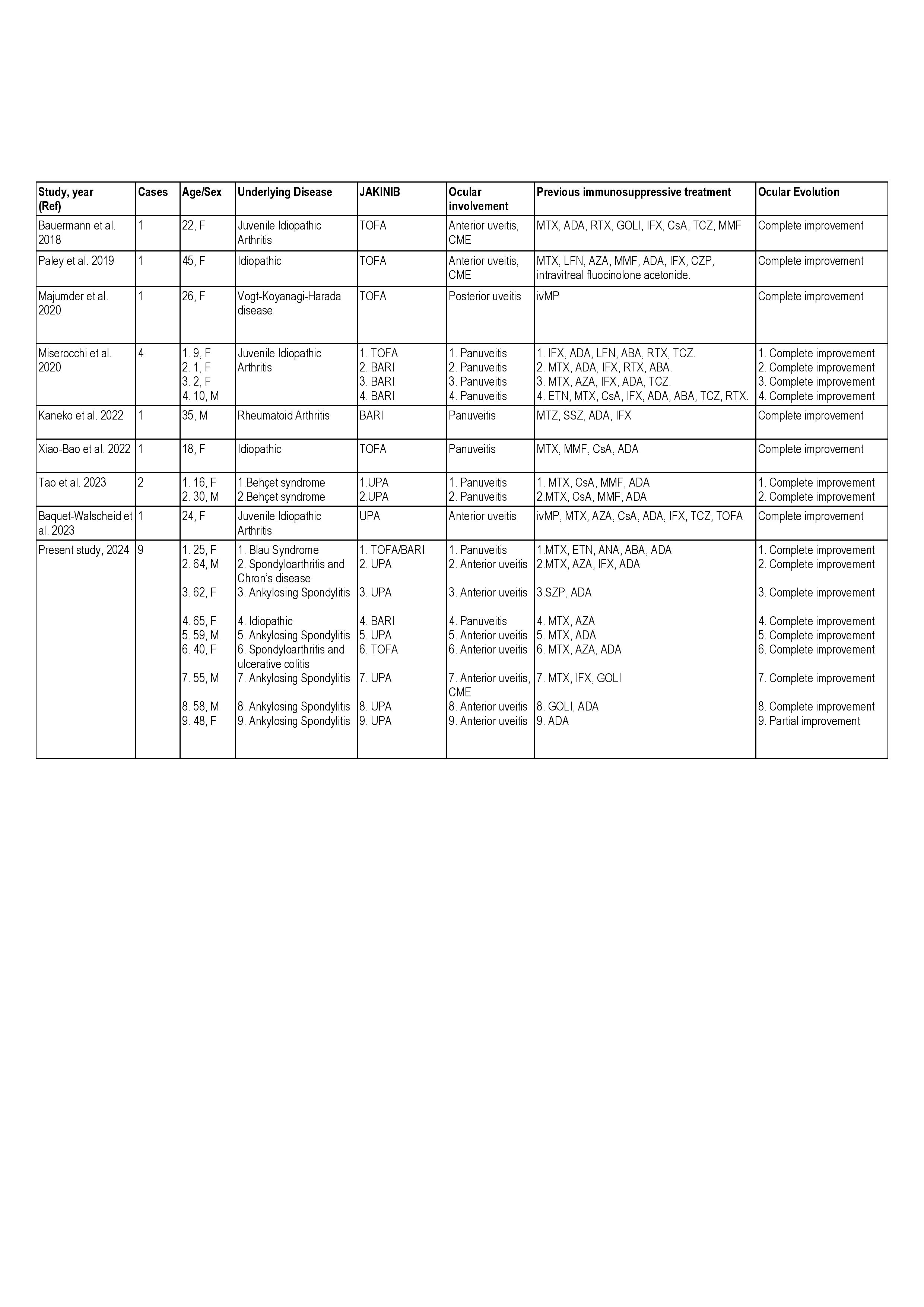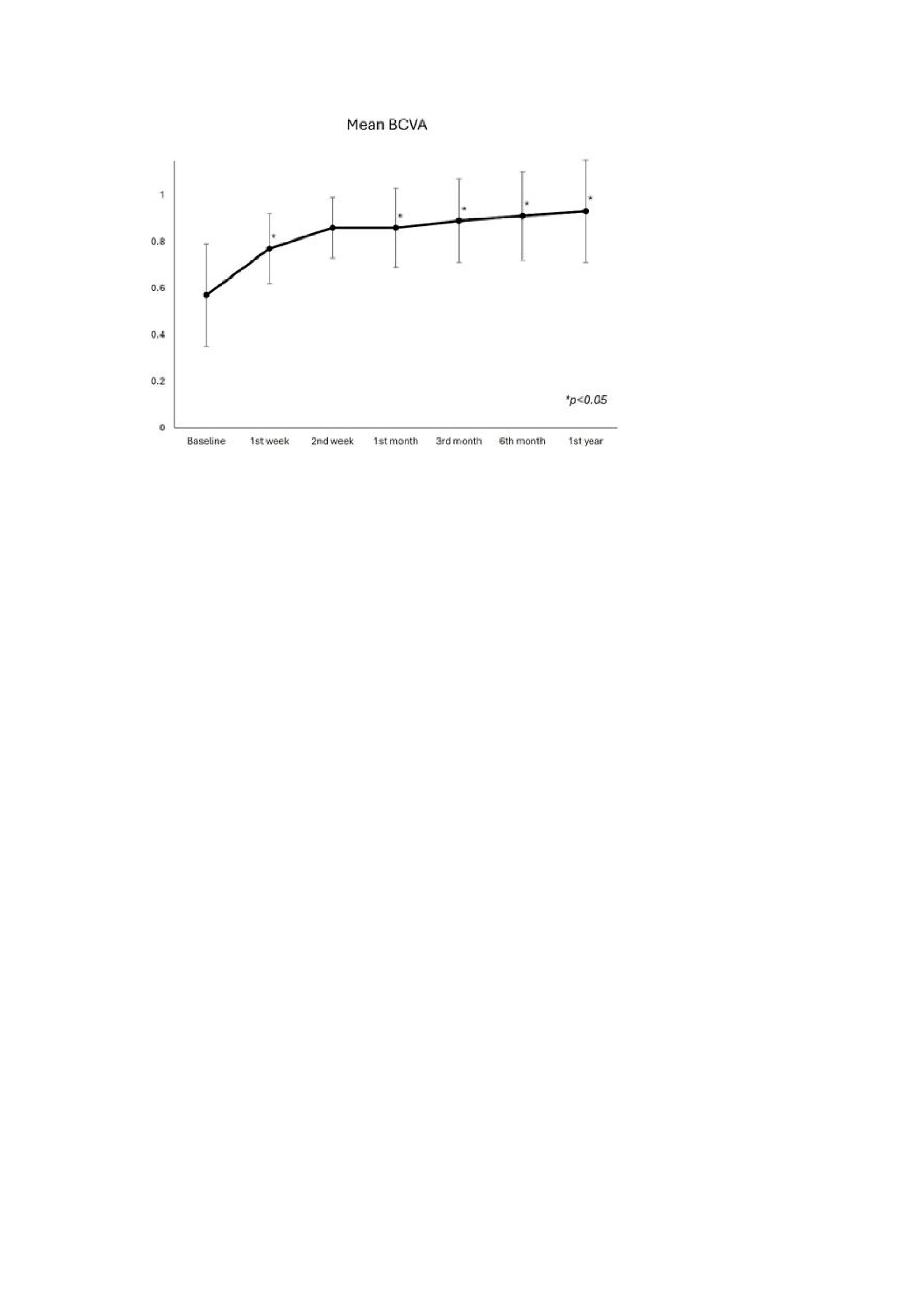Session Information
Session Type: Poster Session B
Session Time: 10:30AM-12:30PM
Background/Purpose: Non-infectious uveitis refractory to conventional immunosuppressants and even biologic therapy can lead to severe ocular conditions. Janus Kinase inhibitors (JAKINIBs) appear to be effective in cases of refractory uveitis due to immune-mediated inflammatory diseases (IMIDs).
Methods: Multicenter study of 9 patients with refractory IMIDs-related uveitis treated with JAKNIBs. From baseline up to 1 year efficacy was assessed with the following ocular parameters: best corrected visual acuity (BCVA), anterior chamber cells and presence of cystoid macular edema.
PubMed, Embase and the Cochrane library were searched from their inception to 1st January 2024 for the literature review. Original research articles studying JAKNIB treatment in patients with uveitis were included.
Results: 9 patients from referral centers in Spain and 12 cases from the literature review were studied. There were 14 women and 7 men (33 affected eyes), mean age 34±21.1 years, and they had different patterns of uveitis: panuveitis (n=10), anterior uveitis (n=10; 3 of them with Cystoid macular), and posterior uveitis (n=1).
18 patients had IMIDs associated uveitis while 3 cases were idiopathic uveitis. The main underlying IMIDs were spondyloarthritis (n=7) and juvenile idiopathic arthritis (n=6) (TABLE).
Treatment with conventional (n=18) or biological immunosuppressive drugs (n=18) was required before the start of JAKNIBs. The JAKINIB most widely used was upadactinib (n= 9) followed by tofacitinib (n=7). No serious adverse effects were found.
A clinical improvement was observed after starting JAKNIBs treatment, 20 patients presented a complete improvement and the remaining patient showed partial improvement. In this patient a reduction in the number of flares was observed (from 4 previous flares to 1 when on treatment).
In the multicenter study, BCVA showed a rapid and maintained improvement (FIGURE) after 13 [5-20] months of follow-up. All patients had Tyndall + at baseline (n=9), with a decrease from the first month (n=3) and resolution by the sixth month. Two patients (22.2%) had cystic macular edema at baseline, which resolved at 3 months of follow-up in one case and at 12 months in the other patient.
Conclusion: JAKNIBs can be effective and safe in uveitis related to different IMIDs. JAKNIBs appear to be effective even in patients refractory to previous biological drugs.
To cite this abstract in AMA style:
Barroso Garcia N, Sanchez Bilbao L, Martin Varillas J, Calvo-Rio V, Esteban Ortega M, muñoz Fernández S, álvarez Vega J, Beltran Catalan E, Jovani V, Maiz Alonso O, Veroz González R, Alvarez Reguera C, Demetrio Pablo R, Blanco-Alonso R. JAK Inhibitor Therapy in Refractory Uveitis Due to Immune-mediated Inflammatory Disorders. Multicenter Study and Literature Review [abstract]. Arthritis Rheumatol. 2024; 76 (suppl 9). https://acrabstracts.org/abstract/jak-inhibitor-therapy-in-refractory-uveitis-due-to-immune-mediated-inflammatory-disorders-multicenter-study-and-literature-review/. Accessed .« Back to ACR Convergence 2024
ACR Meeting Abstracts - https://acrabstracts.org/abstract/jak-inhibitor-therapy-in-refractory-uveitis-due-to-immune-mediated-inflammatory-disorders-multicenter-study-and-literature-review/


